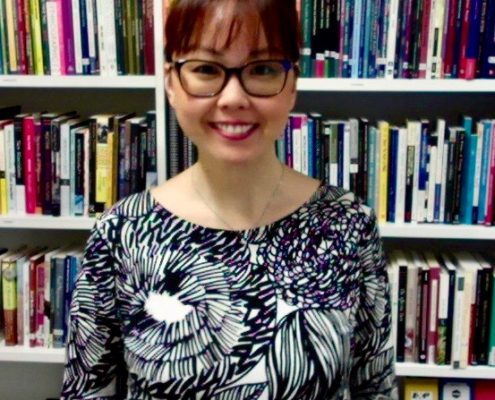Dr Mervi Kaukko
Monash University
Storycrafting with new arrivals
As part of my research with refugee and asylum-seeking students in Finland and Australia, students shared many powerful, beautiful stories about their experiences. The children and I agreed these stories deserve to be heard beyond academic publications. This notion led to a fictional story book Ali and the Long Journey to Australia, and an animation based on the book. The story and artwork were co-created by 13 students at Noble Park Primary School.
In this symposium, I discuss storycrafting as an educational tool to enable newly arrived children use their language(s). I will also encourage the participants to brainstorm on how to create stories with new arrivals and use existing stories (such as the one I will share) in teaching.
Biography
Dr Mervi Kaukko is a lecturer (Education) at Monash University. Her current research ‘Educational Success through the Eyes of a Refugee Child’ explores refugee students’ school experiences, and educational arrangements enable refugee students’ learning in their new home countries.
Before coming to Australia in July 2016, Mervi worked as a lecturer and a teacher educator at University of Oulu, Finland, and conducted research on the praxis development of teachers and educational leaders working with migrant children.
Mervi’s three children Kaneli, Kastanja and Pessi studied in Noble Park Language School in 2016.
Early Years / Primary:
Michelle Andrews
Michelle Andrews is currently working as the EAL specialist at Preston North East Primary school. An experienced Primary EAL teacher, she taught for more than 12 years in the New Arrivals program, undertaking a variety of roles including curriculum leadership. She is an active member of the VicTESOL committee, working mainly in the area of Professional Learning. Passionate about working with other teachers to build excellence in practice, her recent move back into a mainstream Primary school has reinforced her enthusiasm to support student learning and engagement through effective EAL teaching.
Session Details
“Recycling” means actively using and reusing the target language in a variety of carefully planned activities and situations across the curriculum, with gradually decreasing levels of scaffolding, so that it becomes automatic and embedded, and students can reuse it to engage with and talk about new knowledge, or communicate in new situations or for new communicative purposes.”
In this session, we will begin with a brief look at how repetition affects memory. Building on this, we will define the term “recycling,” and examine both some of the theories underlying language recycling, and its use in EAL classroom practice.
Secondary:
Dr Michiko Weinmann
Deakin University
Orientating Multilingualism: Navigating teacher identities
The impact of conversations about language, multilingualism and multiculturalism in education contexts—and their impact on student and teacher interaction—has been frequently remarked upon (Motha, 2014; Cummins & Early, 2010). However, limited research has been undertaken to date to explore the ways in which the normative conditions of language, culture and identity, and their underlying structures and behaviours play out in the practices of Languages and EAL/D teaching.
The data that frames our study was taken from a research project which explored recent changes to Australian Languages and EAL/D curriculum and policy, and its impact on teacher experience and practice. Analysis of the teachers’ conversations about these policies, and their daily experience and practice, made visible the ways in which the discipline areas Languages and EAL/D – and the teachers who taught these subjects – were understood.
The embodied and normative conditions of identity are negotiated and mediated within the frame of language and culture as a multidimensional and reflexive construct defining and shaping normativity and difference (Arber, 2014; May, 2014; Norton, 2013; Spivak, 1999; Weinmann & Arber, 2017). Moreover, Languages and EAL/D teachers’ identities are shaped by the normative terms and conditions of an understanding of languages, Languages and EAL/D education that remains rooted in national, monolingual and unequally empowered perspectives. The authors argue that a deeper interrogation of the production and reproduction of identity and difference, and how these are shaped within the systems teachers work in (Young, 2017) is key to orientating multilingual approaches to Languages and EAL/D education.
Biographies
Dr Michiko Weinmann is Senior Lecturer in Languages education and Co-Director of the Centre for Teaching and Learning Languages (CTaLL) at Deakin University. Her research explores the nexus of language, culture, and identity in global contexts. Bringing together Education and Cultural Studies perspectives, Michiko’s work seeks to contribute to an interdisciplinary reconstitution of established notions of language, culture and identity towards a more complex understanding that regards them as multifaceted, hybrid and fluid. She is passionate about supporting the professional development of pre-service and beginning Languages teachers, and curates the resource website and blog The Language Teacher Helpmate.
Adult / Community:
Joanne Goodman
Melbourne Polytechnic
Change Management: Staying Calm, Communicative and Clear
Adult EAL educators continuously manage changes in new waves of migration cohorts as well as juggling funding contract demands, both challenging in very different ways, requiring an ability to be flexible and ready to adapt. Changes in migration patterns change the demographics in classes, creating a dynamic environment that is in equal parts interesting and challenging. Dependency on first language is greater in adults where culture and language have had longer to form a significant part of an adult person’s identity. Added to this daily complexity is the ever shifting sands of the funding body changes and altered expectations. Managing this continuous change with a calm, clear, communicative approach supports successful EAL delivery. In this workshop we will explore some of these challenges and aspects of successful change management.



